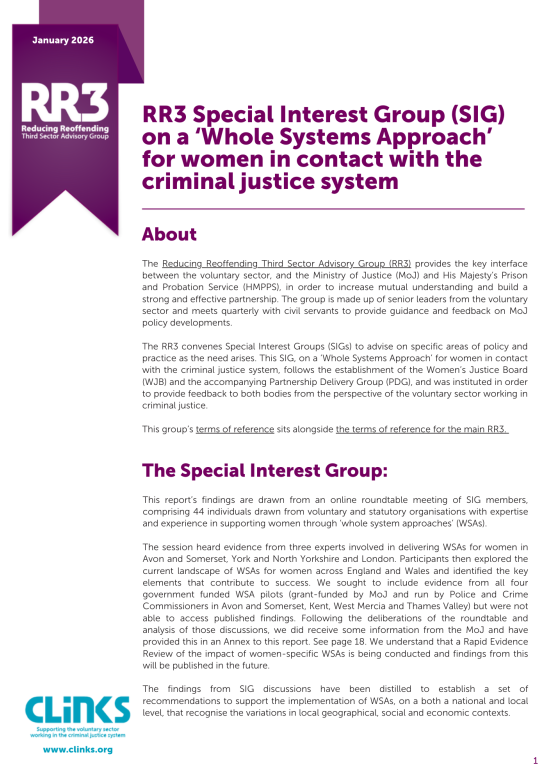This guest blog by Russell Webster takes a look at Clinks' State of the sector research. He explores the value of the research, the findings of our last report, and introduces Clinks' 2019 survey which is now open for voluntary organisations working in the criminal justice system. Help us ensure the voluntary sector’s role, knowledge and expertise is reflected in government policy and maximise opportunities for the sector. The survey only takes 15 minutes and is available here.
For the last six years Clinks, the infrastructure body for the criminal justice voluntary sector, has published a State of the sector report. It’s an invaluable read for myself and most other people working in criminal justice for three main reasons.
Firstly, it’s authoritative and representative. I like to think I’ve got a decent handle on most of the latest developments in criminal justice, but, inevitably, my detailed front line knowledge is disproportionately based on the half a dozen organisations that I’m working directly with at any one time. In my case, these are normally restricted to London and the South East whereas the most recent State of the sector report, published last November, was based on information provided by no less than 193 organisations working with people in contact with the criminal justice system and their families. These organisations range from national powerhouses with thousands of staff to small local operations with just one paid worker. They are based all over the country, facing the different challenges thrown up by inner cities, rural communities and seaside towns.
Secondly, the reports dig deep and provide detailed and nuanced information about the latest developments in the sector. Importantly for someone like me who spends a lot of time summarising reports on my blog (you can see my summary of the 2018 State of the sector report here), Clinks has really upped its presentation game over recent years and good quality infographics provide a quick and easy way to get an instinctual grip on, for example, funding trends in the sector.
Thirdly, because the reports are produced so regularly, they are excellent for spotting trends. Recent additions have made it lamentably easy for all to see just what impact both austerity and the redesign of probation through Transforming Rehabilitation (TR) have had. As readers of my blog will know, the probation service is currently going through yet another remodelling. As with the first version of TR, the Ministry of Justice has announced its intention of involving many more small and medium-sized voluntary sector organisations in the support of people in contact with the criminal justice system. Future State of the sector editions will be able to tell us whether they have been successful.
The headline findings from last year’s State of the sector report were:
- Voluntary organisation are working relentlessly, in difficult circumstances, to support increasing numbers of people who are coming to them with more complex and urgent needs. They’re responding by developing and delivering new services and working in partnership to share knowledge and resources but increasing caseloads are putting staff and volunteers under pressure.
- Organisations supporting people with protected characteristics under the 2010 Equality Act, including from black, Asian and minority ethnic backgrounds, and people with disabilities, are being hit the hardest by the challenging funding environment, and are seeing more people with complex issues in need of immediate attention.
- Voluntary organisations working in prisons and the community are seeing urgent housing needs, substance misuse problems and poor mental health soar, as funding cuts to public services including prison and probation take hold.
- Alongside this, welfare reform, particularly the roll out of Universal Credit, Personal Independent Payments and sanctions are pushing people into poverty and leaving them unable to access accommodation.
- The sector continues to face a challenging financial environment, where organisations are reliant on grants. If they are delivering contracted services, they are often forced to subsidise them with funding from other sources.
- Charitable trusts and foundations continue to provide essential grant funding to charities, especially those providing specialist community-based services.
- Statutory organisations referring people to the voluntary sector are not providing adequate funding meaning organisations need to subsidise funding from other sources, including from charitable trusts and foundations
Clinks is currently gathering information for its 2019 State of the Sector survey. If you work for a voluntary sector organisation in England or Wales that works with people in contact with the criminal justice system in any way at all, please do find the 15 minutes needed to complete the survey. You can find it here.
What's new
Blogs
Violence Against Women and Girls (VAWG) Strategy Blog
Publications
RR3 Special Interest Group (SIG) on a ‘Whole Systems Approach’ for women in contact with the criminal justice system
The RR3 SIG drives a Whole Systems Ap
Latest on X
The role is for a leader from an organisation focused on racially minoritised people, with expertise in service delivery, policy, advocacy, or related areas in criminal justice. Racial disparities are present at every CJS stage. This role ensures these voices are central in shaping policy to help address and eradicate them. Apply by Mon 18 Nov, 10am. More info: https://www.clinks.org/voluntary-community-sector/vacancies/15566 #CriminalJustice #RR3 #RacialEquity

